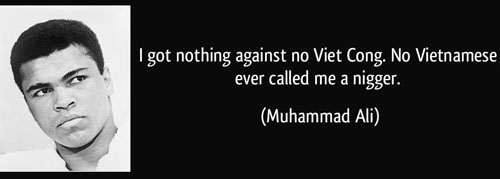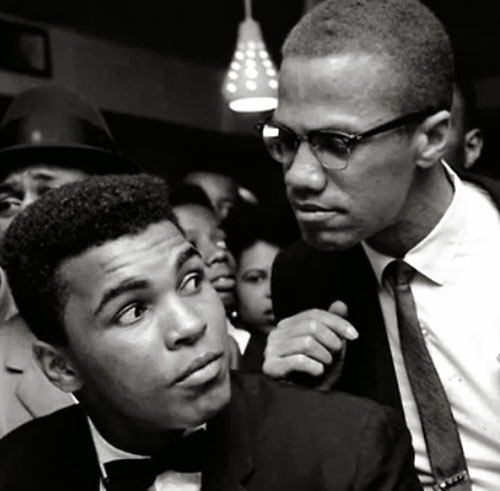BLACK HISTORY MONTH LESSON PLAN: Muhammad Ali when he made his stand against the Vietnam War was reviled, not honored as (later) 'The Greatest'
"No Vietnamese ever called me Nigger" was the quote on a poster that hung in thousands of rooms of young people, bridging the often huge gap between America's Black ghettos and the dormitory rooms of some of the nation's most prestigious colleges and universities. The words were spoken in 1967, the same year that Martin Luther King Jr. proved he was worthy of his recent Nobel Peace Prize by coming out in detail against the U.S. War in Vietnam.
 One of the many posters that was created after the world famous Heavyweight Championship boxer declared that he was a conscientious objector. But if there could have been a gap in those days, it was between the culture that had produced the great Civil Rights leaders and the world that had produced the man who would later -- but definitely not in 1967 -- be called the "Greatest Sportsman of the [20th] Century." When the former Olympic heavyweight boxing champion and current World Professional Heavyweight Boxing Champion declared that he was a conscientious objector because of the War in Vietnam, the hell that broke loose was as great at that arrayed against the pacifist.
One of the many posters that was created after the world famous Heavyweight Championship boxer declared that he was a conscientious objector. But if there could have been a gap in those days, it was between the culture that had produced the great Civil Rights leaders and the world that had produced the man who would later -- but definitely not in 1967 -- be called the "Greatest Sportsman of the [20th] Century." When the former Olympic heavyweight boxing champion and current World Professional Heavyweight Boxing Champion declared that he was a conscientious objector because of the War in Vietnam, the hell that broke loose was as great at that arrayed against the pacifist.
But since Ali's world was the world of workouts and blood, of a "sweet science" that was anything but sweet in it reality, the convergence of the worlds of the two Black leaders -- the sports hero and the man who delivered the "I Have A Dream" speech -- was one of the most important moments in the growing -- but not yet majority -- movement in the USA in opposition to the Vietnam War. And because the man who had begun his life as "Cassius Clay" had proved his courage already in front of the world in brutal man-to-man combat, the additional courage the man who became Muhammad Ali stunned the world at least as much as Dr. King's.
And from the locker room and boxing ring to the pulpit, the truth was ringing out...
The Wikipedia biography of Muhammad Ali is one of the longest, and rightly so. After a boxing career that made him clearly one of the greatest American amateur athletes of the 20th Century, he turned to integrity in addition to his boxing skills and announced that he was a conscientious objector, speaking out publicly against the Vietnam War in 1967, as did his compatriot, Martin Luther King Jr. And like Dr. King, he was denounced widely by many of the same people before, over time, being recognized as "The Greatest" in many ways.
 The influence of Malcolm X and the Black Muslims convinced the boxer who won the Olympics as Cassius Clay to become the world champion Muhammad Ali. "Muhammad Ali (born Cassius Marcellus Clay, Jr.; January 17, 1942) is an American former professional boxer, generally considered among the greatest heavyweights in the sport's history," Wikipedia begins. "A controversial and polarizing figure during his early career, Ali is today widely regarded for not only the skills he displayed in the ring but also the values he exemplified outside of it: religious freedom, racial justice and the triumph of principle over expedience. He is one of the most recognized sports figures of the past 100 years, crowned "Sportsman of the Century" by Sports Illustrated and "Sports Personality of the Century" by the BBC."
The influence of Malcolm X and the Black Muslims convinced the boxer who won the Olympics as Cassius Clay to become the world champion Muhammad Ali. "Muhammad Ali (born Cassius Marcellus Clay, Jr.; January 17, 1942) is an American former professional boxer, generally considered among the greatest heavyweights in the sport's history," Wikipedia begins. "A controversial and polarizing figure during his early career, Ali is today widely regarded for not only the skills he displayed in the ring but also the values he exemplified outside of it: religious freedom, racial justice and the triumph of principle over expedience. He is one of the most recognized sports figures of the past 100 years, crowned "Sportsman of the Century" by Sports Illustrated and "Sports Personality of the Century" by the BBC."
MORE TO COME. THIS ARTICLE WILL BE CONTINUED. PLEASE SEND YOUR MEMORIES OF MUHAMMAD ALI, ESPECIALLY HIS YEARS IN CHICAGO, TO GEORGE N. SCHMIDT AT Gnschmidt@aol.com.

